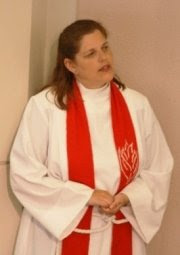If your New Year's Resolution involves your spiritual life here are some ideas of ways to pick up a spiritual practice for 2019:
You could add prayer to your day (once or several times)
·
The easiest way to begin integrating prayer is
to pick a part of your day and add prayer to it. That can be as simple as saying grace before
lunch or dinner every day or saying a prayer when you wake up or go to bed.
·
Prayer, at its base, is talking & listening
to God – so it doesn’t have to be formal “Good morning God” is as good a way to
begin as any other.
·
Many people find that having a structure to
their prayers help a lot
o
Forward Day by Day has a short devotion every
day (it also lists the readings for that day at the top). You can pick up one in any of the literature
racks at church or go to http://prayer.forwardmovement.org/ There is a link to Forward Day by Day so you
can read it on-line
o
Many people pray some portion of what is called “the
Daily Office” That is Morning Prayer, Noonday
Prayer, Evening Prayer, & Compline.
You can do all of those or start with one (if you are starting with one,
start with Noonday Prayer or Compline, which is late night prayer). You can find instructions for the Daily
Office in the front part of the Book of Common Prayer and a schedule of Daily
Office readings in the back. You can get
a Book of Common Prayer for your kindle or on-line at bcponline.org. If you want a hard copy you can order it from
Amazon or let Pastor Vicki know and she can give you one.
o
If you want to pray the daily office on-line you
can do that in a couple of places
§
Prayer.forwardmovement.org posts all four of the
Daily Office prayers every day
§
Mission Saint Claire also offers the Daily
Office on-line every day. This includes
some hymns that you can play if you would like - http://www.missionstclare.com/english/
o
The Book of Common Prayer also has a section
called “Daily Devotions for Individuals and Families”. It is on pages 137 – 140. There are prayers for Morning, Noon, Early
Evening and Close of Day.
·
Many people find that keeping a prayer journal
if very helpful. This can be as simple
as writing down each day what you are praying about. If you want more structure, try making four sections:
People & Thinks I’m Praying For: People & Things I’m Thankful for:
Things I am sorry about: Praise to God and writing something in each section
each day.
You could add Bible Study or Reflection to your day
·
Reading the Bible regularly is one of the best
ways to stay connected with God.
·
At the prayer.forwardmovement.org website you
can find a link to a series of daily readings.
·
St. Paul’s is also doing a Bible Challenge that
has readings for 6 of the 7 days of the week.
In January we are starting the minor prophets – the short books at the
end of the Old Testament. You can pick
up a pamphlet about the Bible Challenge on the Way of Love bulletin boards in
the hallway and the library.
·
If you want to start reading through the whole
Bible, you might with the Gospels (Matthew, Mark, Luke and John) rather than
with Genesis. Another way to start is to
read one Psalm each day (there are 150 Psalms)
·
If you are looking to purchase a Bible for you
or your child, the New Revised Standard Version (NRSV) is what we read in
church on Sunday. The Common English
Bible (CEB) is a newer translation that is accurate and readable. The CEB aims for a 7th – 8th
grade reading level. The NRSV is at
about an 11th grade reading level.
·
If you want to read Bible stories with children
there are several good Bible story books
o
Tomie dePaola’s Book of Bible Stories (GP
Putnam’s, 1990), ages 2-10.
o
Spark Story Bible: Sunday School Edition
(Augsburg Fortress, 2009), ages 3-7.
o
Children
of God Storybook Bible by Desmond Tutu (Zonderkidz, 2010), ages 4-8.
o
Shine On:
A Story Bible (MennoMedia, 2014),
ages 8-11
o
The
Complete Illustrated Children’s Bible by Janice Emmerson (Harvest House,
2014), ages 7-11.
o
The
Children’s Illustrated Story Bible by Selena Hastings (Dorling Kindersley,
2004), ages 8-12.
o
The Lion
Bible for Children by Murray
Watts, Helen Cann (Lion Hudson, 2014), ages 9-12.
o
Thank you to Church Publishing Incorporated for
this list from their Way of Love for Families resource.
Worship is an important part of the life of the spirit
Gathering with other Christians to praise God and be in
community is an important part of keeping our spiritual life balanced. Committing (or recommitting) to regular
attendance at worship can help ground our spiritual lives.
Rest is also a part of the life of the spirit
It is very difficult for us as 21st century
Americans to really rest. We tend to try
to schedule or program our rest. One way
to start adding rest to your spiritual practice is to pick a few hours each
week (it doesn’t have to be the same time each week) where you don’t schedule
anything, create a space of time where you can just be and not have to do.
